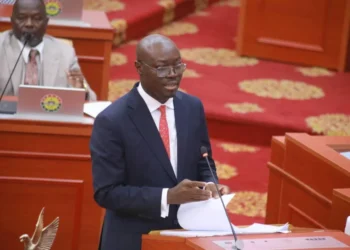Results of latest data from the bond market has disclosed that a notable exodus of investors from Ghana’s bond market, with activity plummeting by 52.9%.
The front end of the Local Currency (LCY) yield curve continued to dominate market activity, accounting for over 55% of the total weekly turnover. The dominance of shorter-term securities at the front end of the Local Currency (LCY) yield curve further underscores investors’ preference for safer, more liquid assets amid uncertain market conditions.
This risk aversion may have led investors to favor short-duration bonds over longer-dated instruments, resulting in decreased trading activity at the tail of the yield curve.
Interestingly, despite the overall decline in market activity, there were some minor exchanges involving the February 2036 papers at the tail of the LCY curve. This suggests that while investor appetite may be subdued, there remains interest in longer-dated instruments, albeit to a lesser extent.
This significant decline has sparked concerns among market participants and raised questions about the underlying factors driving this mass departure.
The sharp slump in bond market activity, according to some analysts, can be attributed to several key factors. Firstly, the shortened trading week due to the Eid ul-Fitr celebration played a role in reducing trading volume and investor participation. With fewer trading days available, market activity naturally contracted, leading to a notable drop in turnover.
Additionally, ongoing economic uncertainties both domestically and globally have likely contributed to the flight from the bond market. The lingering effects of the COVID-19 pandemic, coupled with volatile commodity prices and geopolitical tensions, have weighed on investor confidence and risk appetite. In such uncertain times, investors tend to adopt a more cautious approach, which can manifest in reduced investment activity in fixed-income securities like bonds.
In broader economic news, Ghana recently achieved an International Monetary Fund (IMF) Staff-Level agreement on its second review, receiving positive feedback on key benchmarks and gradual economic progress. Of particular note is Ghana’s trajectory towards achieving a fiscal primary surplus of 0.5% of Gross Domestic Product (GDP) in 2024.
This development is significant for the bond market, as it helps alleviate concerns surrounding the country’s fiscal position, particularly in the midst of an election year. A fiscal primary surplus indicates that the government’s revenue exceeds its non-interest spending, a positive sign for investors who closely monitor fiscal sustainability.
The IMF’s endorsement of Ghana’s fiscal performance is expected to bolster investor confidence in the country’s economic prospects, potentially translating into increased demand for Ghanaian bonds. Moreover, it signals a vote of confidence in the government’s commitment to fiscal discipline and prudent economic management.
However, it’s essential to remain vigilant amid lingering uncertainties, both domestically and globally. The ongoing COVID-19 pandemic, coupled with volatile commodity prices and geopolitical tensions, continue to pose risks to Ghana’s economic outlook. Any adverse developments on these fronts could potentially dampen investor sentiment and weigh on bond market activity.
The Implications of This Mass Exodus from Ghana’s Bond Market
The implications of this mass exodus from Ghana’s bond market are far-reaching. Firstly, it reflects subdued market sentiment and waning investor confidence, which could hinder the country’s ability to raise capital through bond issuances. This, in turn, may impact government financing for crucial projects and infrastructure development.
Moreover, the slump in bond market activity raises concerns about Ghana’s fiscal outlook and economic growth prospects. The performance of the bond market is closely linked to the fiscal health of the issuing government, and a decline in market activity could signal broader concerns about the country’s ability to manage its finances effectively.
Despite the gloomy outlook, there may be opportunities for savvy investors willing to navigate the current market landscape. Monitoring key economic indicators, fiscal policies, and investor sentiment will be crucial in identifying potential investment opportunities and capitalizing on market fluctuations.
Looking ahead, market participants will closely monitor developments in Ghana’s fiscal consolidation efforts, as well as external factors that could impact investor sentiment. Additionally, the upcoming elections will be a key event to watch, as political stability is a crucial factor for investor confidence.
While the current slump in activity may be a cause for concern, it also presents an opportunity for policymakers and investors to reassess strategies and adapt to the evolving market environment. Only time will tell how Ghana’s bond market will rebound from this setback and regain investor confidence.
READ ALSO: Blue Chips Propel GSE to New Heights























